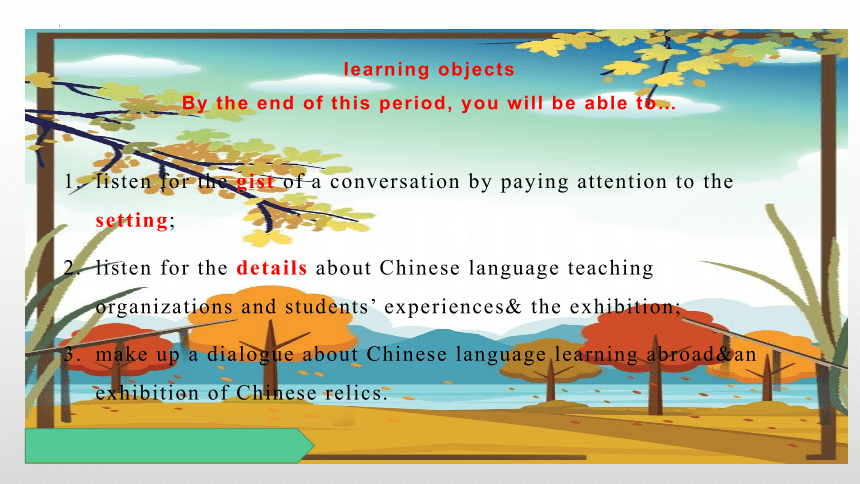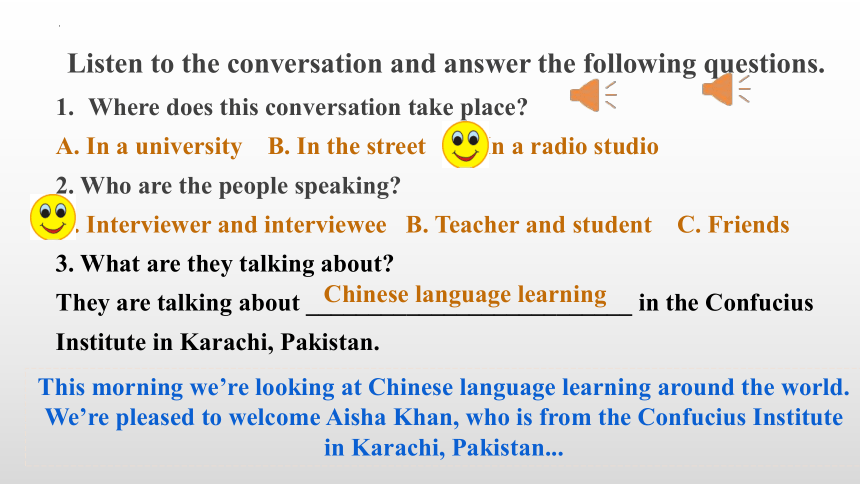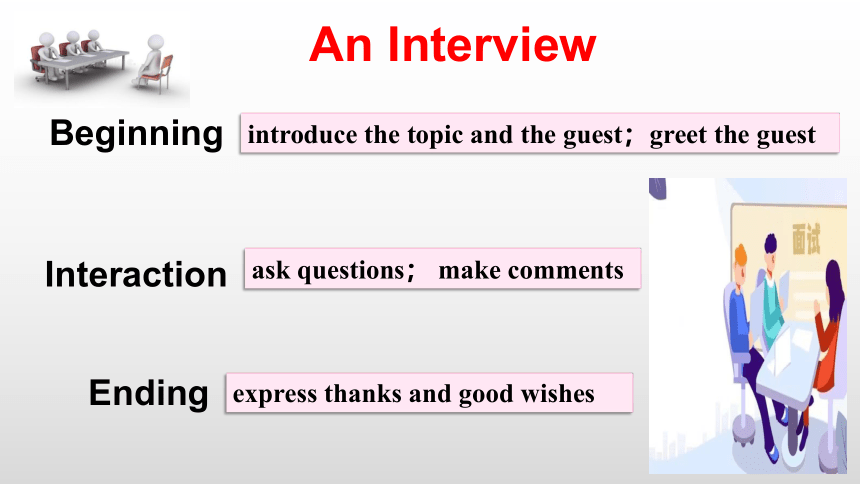人教版(2019)>选择性必修 第二册Unit 2 Bridging Cultures Listening and Speaking课件(共19张PPT,内镶嵌视频和音频)
文档属性
| 名称 | 人教版(2019)>选择性必修 第二册Unit 2 Bridging Cultures Listening and Speaking课件(共19张PPT,内镶嵌视频和音频) |  | |
| 格式 | pptx | ||
| 文件大小 | 47.0MB | ||
| 资源类型 | 教案 | ||
| 版本资源 | 人教版(2019) | ||
| 科目 | 英语 | ||
| 更新时间 | 2024-01-01 14:00:39 | ||
图片预览







文档简介
(共19张PPT)
Listening and speaking
Talk about Chinese language learning abroad
Unit 2 Bridging Cultures
Iearning objects
By the end of this period, you will be able to…
listen for the gist of a conversation by paying attention to the setting;
listen for the details about Chinese language teaching organizations and students’ experiences& the exhibition;
make up a dialogue about Chinese language learning abroad&an exhibition of Chinese relics.
Lead in
Pay attention to the setting(背景)
When you listen, always ask yourself, “Where is this probably happening " Understanding the setting will help you understand the type and content of the communication more clearly.
Listening tip
Listen to the conversation and answer the following questions.
Where does this conversation take place
A. In a university B. In the street C. In a radio studio
2. Who are the people speaking
A. Interviewer and interviewee B. Teacher and student C. Friends
3. What are they talking about
They are talking about __________________________ in the Confucius Institute in Karachi, Pakistan.
Chinese language learning
This morning we’re looking at Chinese language learning around the world. We’re pleased to welcome Aisha Khan, who is from the Confucius Institute in Karachi, Pakistan...
An Interview
Beginning
Interaction
Ending
introduce the topic and the guest;greet the guest
ask questions; make comments
express thanks and good wishes
Confucius Institute
With China’s rapid economic growth and wide exchanges with the rest of the world, there has been a sharp increase in the world demand for Chinese language learning. To meet the increasing demands for Chinese learning, the Chinese government decided to set up Confucius Institutes in foreign countries. The first Confucius Institute was set up in South Korea in 2004. Confucius Institutes adopt flexible teaching patterns to suit local conditions while teaching Chinese language and promoting cultural exchange in foreign schools, universities, communities, and enterprises.
Confucius Institutes
purpose
function
purpose
reason
development
Listen again and take notes by filling in the poster below.
At first, we only had a few students and teachers… The institute is also a centre for Chinese activities, like a bridge into China.
Welcome to the Confucius Institute.
Learn to _____________ and all about ________________!
Our institute has grown! We started with _________________________ but now we have many more. It is a centre for __________________. You can learn and practise fascinating Chinese traditions.
Apart from language, she taught us about Chinese culture
speak Chinese
Chinese culture
a few students and teachers
Chinese activities
While listening
You can learn and practise fascinating Chinese traditions. Knowledge of the Chinese language and culture is important because of increasing __________________________________.
Many students go on to great jobs in __________________.
Join us today to help break down language and _________________, and bring the world together!
While-listening
I believe its importance has grown ,because trade between China and Pakistan has increased….
trade between China and Pakistan
cultural barriers
Chinese companies
While listening
P18 E4 Answer the questions according to what you remember of the conversation.
1. What made Aisha feel like she was part of Ms Hu's family
Making and eating delicious dumplings together in Ms Hu’s home made Aisha feel like she was part of her family.
2. Why did Aisha want to become a teacher
Because she wanted to carry on Ms Hu’s work.
3. Why do students learning Chinese see it as beneficial to their
future
Because learning Chinese would help them find good jobs at Chinese companies.
Interviewing someone
Imagine you’re interviewing a student at a Confucius Institute in another country about his or her experience. Work with a partner to brainstorm what the interviewer might ask and how the student might answer. Then role-play the interview. Use the phrases and questions in the box to help you. P18 E5
We are pleased to welcome
Thanks for joining us.
Tell us more about ...
Thanks for your time.
It was a pleasure talking with you.
What was your biggest challenge
How did you overcome it
What are you keen on
What is the key to your success
What do you feel is your biggest achievement
Example:
A: Hi, Jane. Welcome to the show!
B: Thanks for inviting me.
A: Tell us, what was your biggest challenge in learning Chinese at the beginning
B: Well, I suppose it was difficult to grasp the tones at first.
A: I bet! Did joining the Confucius Institute help overcome this problem
B: Absolutely! Getting involved with Chinese cultural activities there definitely helped a lot ...
(P19)
Pronunciation
What may be the cause of the problem
1. Read the conversation and answer the questions:
Lu Yao is having a problem with an English listening task.
He has trouble hearing the weak forms of the words which are not stressed.
He should pay more attention to the weak forms, watch some movies, and study how the weak forms are used.
What problem is Lu Yao having
How can he solve his problem
2. Listen to the conversation above and underline the weak forms the speakers used. Then practice the conversation with your partner.
Lu Yao: Excuse me, Miss Conner. I'm having a problem with
this English listening task. Some words are
pronounced really fast and sound different.
Miss Conner: Oh, let me listen .. Yes, that's probably because
the words are not being stressed. You see, English is
a stress-based language.
Lu Yao: So does this mean I need to know which words are
stressed and which are not
Miss Conner: Yes, I'm afraid so. English words have a strong
form and a weak form.Words like pronouns, articles,
prepositions, and so on are often not stressed. So we
usually use the weak form for them when we speak.
Lu Yao: Excuse me, Miss Conner. I'm having a problem with
this English listening task. Some words are
pronounced really fast and sound different.
Miss Conner: Oh, let me listen .. Yes, that's probably because
the words are not being stressed. You see, English is
a stress-based language.
Lu Yao: So does this mean I need to know which words are
stressed and which are not
Miss Conner: Yes, I'm afraid so. English words have a strong
form and a weak form.Words like pronouns, articles,
prepositions, and so on are often not stressed. So we
usually use the weak form for them when we speak.
Lu Yao: Oh no. When I speak, I worry people won't
understand me, so I always try to pronounce all my
words really clearly. No wonder my classmates say I
sound like a robot!
Miss Conner: Oh dear! Well, I suggest you pay more
attention to the weak forms. For example, in the
sentence "Are you studying hard ", the words“are"
and "you" are pronounced as /a/ and /ja/.
Lu Yao: Oh, I get it. Thanks, Miss Conner.
Miss Conner: You're welcome. I also suggest you watch some
movies and study how the weak forms are used.
Lu Yao: That's great advice, Miss Conner! I'm going to
watch a movie right now. Thanks again! Bye!
Lu Yao: Oh no. When I speak, I worry people won't
understand me, so I always try to pronounce all my
words really clearly. No wonder my classmates say I
sound like a robot!
Miss Conner: Oh dear! Well, I suggest you pay more
attention to the weak forms. For example, in the
sentence "Are you studying hard ", the words“are"
and "you" are pronounced as /a/ and /ja/.
Lu Yao: Oh, I get it. Thanks, Miss Conner.
Miss Conner: You're welcome. I also suggest you watch some
movies and study how the weak forms are used.
Lu Yao: That's great advice, Miss Conner! I'm going to
watch a movie right now. Thanks again! Bye!
Thank you
Listening and speaking
Talk about Chinese language learning abroad
Unit 2 Bridging Cultures
Iearning objects
By the end of this period, you will be able to…
listen for the gist of a conversation by paying attention to the setting;
listen for the details about Chinese language teaching organizations and students’ experiences& the exhibition;
make up a dialogue about Chinese language learning abroad&an exhibition of Chinese relics.
Lead in
Pay attention to the setting(背景)
When you listen, always ask yourself, “Where is this probably happening " Understanding the setting will help you understand the type and content of the communication more clearly.
Listening tip
Listen to the conversation and answer the following questions.
Where does this conversation take place
A. In a university B. In the street C. In a radio studio
2. Who are the people speaking
A. Interviewer and interviewee B. Teacher and student C. Friends
3. What are they talking about
They are talking about __________________________ in the Confucius Institute in Karachi, Pakistan.
Chinese language learning
This morning we’re looking at Chinese language learning around the world. We’re pleased to welcome Aisha Khan, who is from the Confucius Institute in Karachi, Pakistan...
An Interview
Beginning
Interaction
Ending
introduce the topic and the guest;greet the guest
ask questions; make comments
express thanks and good wishes
Confucius Institute
With China’s rapid economic growth and wide exchanges with the rest of the world, there has been a sharp increase in the world demand for Chinese language learning. To meet the increasing demands for Chinese learning, the Chinese government decided to set up Confucius Institutes in foreign countries. The first Confucius Institute was set up in South Korea in 2004. Confucius Institutes adopt flexible teaching patterns to suit local conditions while teaching Chinese language and promoting cultural exchange in foreign schools, universities, communities, and enterprises.
Confucius Institutes
purpose
function
purpose
reason
development
Listen again and take notes by filling in the poster below.
At first, we only had a few students and teachers… The institute is also a centre for Chinese activities, like a bridge into China.
Welcome to the Confucius Institute.
Learn to _____________ and all about ________________!
Our institute has grown! We started with _________________________ but now we have many more. It is a centre for __________________. You can learn and practise fascinating Chinese traditions.
Apart from language, she taught us about Chinese culture
speak Chinese
Chinese culture
a few students and teachers
Chinese activities
While listening
You can learn and practise fascinating Chinese traditions. Knowledge of the Chinese language and culture is important because of increasing __________________________________.
Many students go on to great jobs in __________________.
Join us today to help break down language and _________________, and bring the world together!
While-listening
I believe its importance has grown ,because trade between China and Pakistan has increased….
trade between China and Pakistan
cultural barriers
Chinese companies
While listening
P18 E4 Answer the questions according to what you remember of the conversation.
1. What made Aisha feel like she was part of Ms Hu's family
Making and eating delicious dumplings together in Ms Hu’s home made Aisha feel like she was part of her family.
2. Why did Aisha want to become a teacher
Because she wanted to carry on Ms Hu’s work.
3. Why do students learning Chinese see it as beneficial to their
future
Because learning Chinese would help them find good jobs at Chinese companies.
Interviewing someone
Imagine you’re interviewing a student at a Confucius Institute in another country about his or her experience. Work with a partner to brainstorm what the interviewer might ask and how the student might answer. Then role-play the interview. Use the phrases and questions in the box to help you. P18 E5
We are pleased to welcome
Thanks for joining us.
Tell us more about ...
Thanks for your time.
It was a pleasure talking with you.
What was your biggest challenge
How did you overcome it
What are you keen on
What is the key to your success
What do you feel is your biggest achievement
Example:
A: Hi, Jane. Welcome to the show!
B: Thanks for inviting me.
A: Tell us, what was your biggest challenge in learning Chinese at the beginning
B: Well, I suppose it was difficult to grasp the tones at first.
A: I bet! Did joining the Confucius Institute help overcome this problem
B: Absolutely! Getting involved with Chinese cultural activities there definitely helped a lot ...
(P19)
Pronunciation
What may be the cause of the problem
1. Read the conversation and answer the questions:
Lu Yao is having a problem with an English listening task.
He has trouble hearing the weak forms of the words which are not stressed.
He should pay more attention to the weak forms, watch some movies, and study how the weak forms are used.
What problem is Lu Yao having
How can he solve his problem
2. Listen to the conversation above and underline the weak forms the speakers used. Then practice the conversation with your partner.
Lu Yao: Excuse me, Miss Conner. I'm having a problem with
this English listening task. Some words are
pronounced really fast and sound different.
Miss Conner: Oh, let me listen .. Yes, that's probably because
the words are not being stressed. You see, English is
a stress-based language.
Lu Yao: So does this mean I need to know which words are
stressed and which are not
Miss Conner: Yes, I'm afraid so. English words have a strong
form and a weak form.Words like pronouns, articles,
prepositions, and so on are often not stressed. So we
usually use the weak form for them when we speak.
Lu Yao: Excuse me, Miss Conner. I'm having a problem with
this English listening task. Some words are
pronounced really fast and sound different.
Miss Conner: Oh, let me listen .. Yes, that's probably because
the words are not being stressed. You see, English is
a stress-based language.
Lu Yao: So does this mean I need to know which words are
stressed and which are not
Miss Conner: Yes, I'm afraid so. English words have a strong
form and a weak form.Words like pronouns, articles,
prepositions, and so on are often not stressed. So we
usually use the weak form for them when we speak.
Lu Yao: Oh no. When I speak, I worry people won't
understand me, so I always try to pronounce all my
words really clearly. No wonder my classmates say I
sound like a robot!
Miss Conner: Oh dear! Well, I suggest you pay more
attention to the weak forms. For example, in the
sentence "Are you studying hard ", the words“are"
and "you" are pronounced as /a/ and /ja/.
Lu Yao: Oh, I get it. Thanks, Miss Conner.
Miss Conner: You're welcome. I also suggest you watch some
movies and study how the weak forms are used.
Lu Yao: That's great advice, Miss Conner! I'm going to
watch a movie right now. Thanks again! Bye!
Lu Yao: Oh no. When I speak, I worry people won't
understand me, so I always try to pronounce all my
words really clearly. No wonder my classmates say I
sound like a robot!
Miss Conner: Oh dear! Well, I suggest you pay more
attention to the weak forms. For example, in the
sentence "Are you studying hard ", the words“are"
and "you" are pronounced as /a/ and /ja/.
Lu Yao: Oh, I get it. Thanks, Miss Conner.
Miss Conner: You're welcome. I also suggest you watch some
movies and study how the weak forms are used.
Lu Yao: That's great advice, Miss Conner! I'm going to
watch a movie right now. Thanks again! Bye!
Thank you
